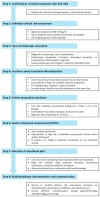GLP-1 Receptor Agonists and Gastrointestinal Endoscopy: A Narrative Review of Risks, Management Strategies, and the Need for Clinical Consensus
- PMID: 40807216
- PMCID: PMC12347859
- DOI: 10.3390/jcm14155597
GLP-1 Receptor Agonists and Gastrointestinal Endoscopy: A Narrative Review of Risks, Management Strategies, and the Need for Clinical Consensus
Abstract
Background/Objectives: Glucagon-like peptide-1 receptor agonists (GLP-1 RAs) have transformed the management of type 2 diabetes mellitus and obesity. However, their sustained effect on delaying gastric emptying raises new challenges in gastrointestinal endoscopy performed under sedation. This narrative review aims to summarize current evidence on the impact of GLP-1 RAs on gastric motility and to propose clinical strategies to mitigate associated procedural risks. Methods: A narrative review was conducted integrating findings from scintigraphy, capsule endoscopy, gastric ultrasound, and existing clinical guidelines. Emphasis was placed on studies reporting residual gastric content (RGC), anesthetic safety outcomes, and procedural feasibility in patients undergoing endoscopy while treated with GLP-1 RAs. Results: GLP-1 RAs significantly increase the prevalence of clinically relevant RGC, despite prolonged fasting, with potential implications for airway protection and sedation safety. Although the risk of pulmonary aspiration remains low (≤0.15%), procedural delays, modifications, or cancellations can occur in up to 30% of cases without adapted protocols. Several professional societies (AGA, ASGE, AASLD) advocate for individualized management based on procedure type, symptomatology, treatment phase, and point-of-care gastric ultrasound (POCUS), in contrast to the systematic discontinuation recommended by the ASA. Conclusions: Effective management requires personalized fasting protocols, risk-based stratification, tailored anesthetic approaches, and interprofessional coordination. We propose a clinical decision algorithm and highlight the need for training in gastrointestinal pharmacology, POCUS, and airway management for endoscopists. Future priorities include prospective validation of clinical algorithms, safety outcome studies, and the development of intersocietal consensus guidelines.
Keywords: GLP-1 receptor agonists; endoscopy; risk.
Conflict of interest statement
The authors declare no conflicts of interest.
Figures


References
-
- Madsbad S., Kielgast U., Asmar M., Deacon C.F., Torekov S.S., Holst J.J. An overview of once-weekly glucagon-like peptide-1 receptor agonists—Available efficacy and safety data and perspectives for the future. Diabetes Obes. Metab. 2011;13:394–407. doi: 10.1111/j.1463-1326.2011.01357.x. - DOI - PubMed
-
- Hiramoto B., McCarty T.R., Lodhia N.A., Jenkins A., Elnaiem A., Muftah M., Flanagan R., Chan W.W. Quantified Metrics of Gastric Emptying Delay by Glucagon-Like Peptide-1 Agonists: A Systematic Review and Meta-Analysis With Insights for Periprocedural Management. Am. J. Gastroenterol. 2024;119:1126–1140. doi: 10.14309/ajg.0000000000002820. - DOI - PMC - PubMed
Publication types
LinkOut - more resources
Full Text Sources
Miscellaneous

